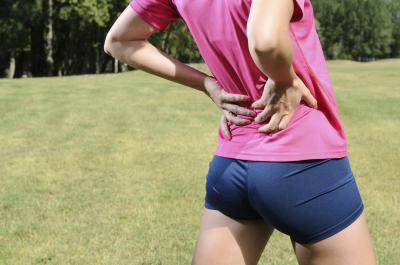Estimated reading time: 0 minutes
When a spinal disc problem causes back pain, either a nerve irritated by a protruding disc or the disc itself is to blame. Doctors may use different terminology to characterize the problem, such as slipping disc, bulging disc, pinched nerve, and/or degenerative disc, making it difficult to distinguish between the two.
Continue reading to learn more about the effects of a compressed nerve or a disc disorder.
Pinched nerve
When a spinal disc causes mechanical compression, irritation, or inflammation of a nearby nerve root, pain is produced by nerve discomfort caused by the disc’s incursion. A pinched nerve root in the lower back may radiate discomfort down the nerve’s path into the leg and foot. A neurological disorder is characterized by numbness, paralysis, tingling, and/or a pins-and-needles feeling.
Radiculopathy is the medical term for this type of discomfort. Sciatica is a radiculopathy induced by irritation or compression of specific nerve roots in the lower back (L4 to S3).
The following factors can result in compressed nerves:
Hernia of the disc
Stenosis of the spinal canal
Due to osteoarthritis, bone spurs develop.
Less frequently, a constricted nerve can be caused by other conditions, such as a tumor, an infection, or spondylolisthesis.
Pain caused by a degenerated disc
If the intervertebral disc is the source of your back pain, the condition is known as discogenic back pain. Due to wear and strain or trauma, a spinal disc can deteriorate and cause discomfort through the following mechanisms:
- inflammatory response. As the disc degenerates, inflammatory proteins may be discharged into the disc space. A degenerative disc has the potential to herniate, enabling its inflamed contents to leak out. These inflammatory chemicals may cause pain by irritating or inflaming nearby nerves. As previously stated, herniated discs can also cause pinched nerve irritation.
- The shrinking of. Disc degeneration can lead to dehydration, resulting in fluid loss and shrinkage. The degree of disc degeneration can constrict the spinal canal, resulting in radiculopathy.
- Instability of segments of motion. Disc degeneration can also render a vertebral segment unstable and less capable of resisting spinal motion.
As the body attempts to combat inflammation, instability, and pain, the local muscles may spasm, causing acute, shooting pain and exacerbating back pain. A degenerative disc may produce localised pain or radiate to the leg (radiculopathy).
Focus on the origin of your distress.
If you focus on the underlying cause of your pain rather than symptom reduction, you will have the greatest chance of finding an effective treatment plan that provides long-term relief. A physician can conduct clinical and diagnostic tests to determine the precise cause of your discomfort and develop an effective treatment plan.
Related-
Know more about Ayurvedic Spinal Disk & Radiculopathy Treatments.
GET IN TOUCH


Recent comments